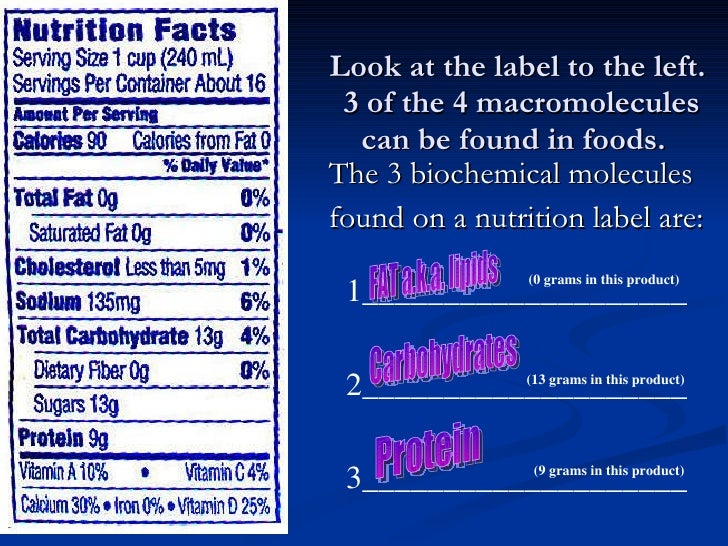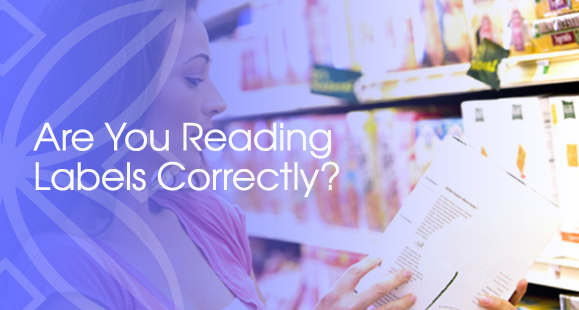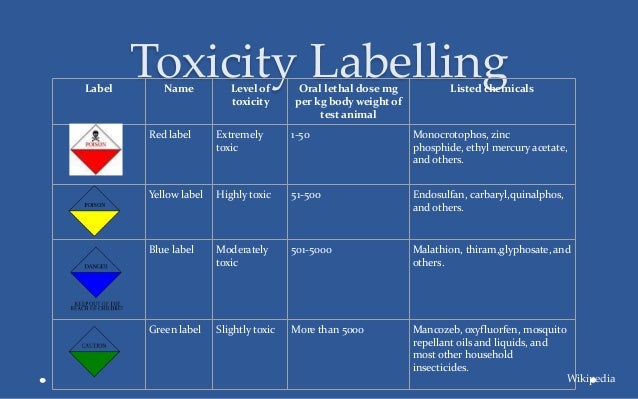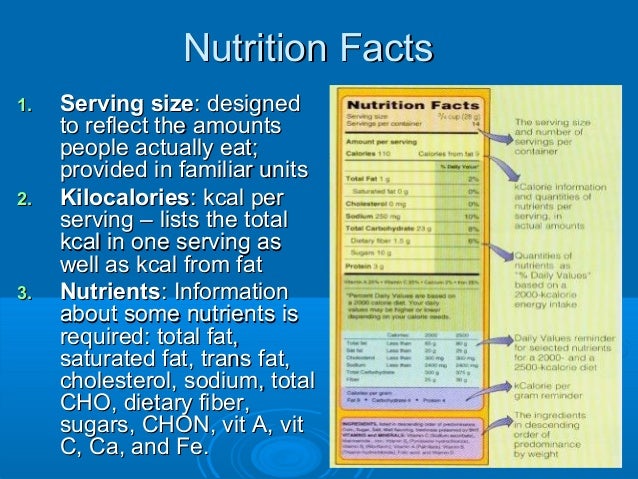44 why should you read food labels
Learn How the Nutrition Facts Label Can Help You Improve ... Read the Nutrition Facts labels on your packaged food and drinks to keep track of sugars, fats, protein, and other nutrients. Most sodium we consume is from salt, and salt is commonly in processed foods. Read labels and choose the product with less sodium. Drink plain water instead of sugary beverages. 15 Most Deceptive Food Label Terms That Are Fooling You ... Companies are required to meet minimum governmental standards for product packaging and quality, and many times, the minimum is what you get. Misleading food labels are prevalent in supermarkets, so it is your responsibility to sift through the bad to get to the good. We've comprised a list of more than a dozen deceptive food label terms that aren't really what they seem, to help you do just that.
Can food labels influence dietary choices? Color-coded labels and warning labels are in common use on the front of food packages globally. They aim to encourage people to eat more healthily to reduce the burden of diet-related illnesses and...

Why should you read food labels
Nutrition labels: Finding out about the food you eat Food labels are reliable sources of nutrition information that can help you make knowledgeable choices for living a healthy lifestyle. All information on the nutrition label is based on a specific amount of food called the serving size. When you compare products, ensure that the serving sizes are the same. Chemical Ingredients 101: How to Read a Product Label Product manufacturers and chemists routinely rely on technical standards when labeling their products. This helps to ensure quality and consistency. With a little research using credible sources, you can find out why a chemical, or any other specific ingredient, is in a product. The Basics of the Nutrition Facts Label The following is a quick guide to reading the Nutrition Facts label. Step 1: Start with the Serving Size Look here for both the serving size (the amount people typically eat at one time) and the number of servings in the package. Compare your portion size (the amount you actually eat) to the serving size listed on the panel.
Why should you read food labels. How to Read a Nutrition Label, According to Registered ... The nutrition label offers valuable insight to shoppers by showing exactly how much fiber, protein, vitamins, minerals, and other nutrients a serving of a particular food offers. That way, you'll be able to make an informed decision to add it to your plate — or not. Top Reasons Why Having Food Labels is Important | Sticky Biz Food labels are also important in helping customers avoid health risks, especially if they have allergies or ingredients they should avoid. By keeping your customers informed of the potential risks to their health, you help them decide on the best product for them - and food labels play a key role in this. Instructions Reading Food Packages and Nutrition Labels: Tips for Savvy ... Food packages tend to be plastered with bold, exciting, and mostly meaningless, unregulated assertions. Rule number one, as registered dietitian Jeff Novick likes to say, is "don't believe anything you read on the front of a package." In other words, be wary of deceptive marketing hype that makes junk foods appear healthy. label reading - PLANTSTRONG What Should I Look for When I Read Nutrition Labels? Learn to Become a Label Reading Ninja! Use this quick-and-easy method to find health-promoting products in your grocery store! Never, ever, ever believe anything on the front of a package.
Reading food labels: Tips if you have diabetes - Mayo Clinic Reading food labels can help you make the best choices. Start with the list of ingredients When you're looking at food labels, start with the list of ingredients. Keep an eye out for heart-healthy ingredients, especially those that are less processed, such as whole-wheat flour, soy and oats. Reading Food Labels - What You Need to Know Reading labels may help you get enough of the nutrients you need each day to be healthy. Reading labels may also help you to eat less of the nutrients that could cause health problems. Eating too much fat, saturated (SACH-er-ay-ted) fat, trans fat, cholesterol (koh-LES-ter-ol) and sodium may increase your risk for certain health problems. What Are Natural Flavors? You'll Be Disgusted When You ... The truth is that when you see the word "flavor" on a food label, you have almost no clue what chemicals may have been added to the food under the umbrella of this vague term. For people who have uncommon food allergies or are on restricted diets, this can be a serious concern. Use-By, Sell-By, Best-By: Food Dating Labels Explained A new guide from PIRG Consumer Watchdog explains food dating labels, like "Use-By" and "Sell-By," and says better public knowledge could prevent over half a million tons of food waste.
How to Read a Nutrition Facts Label | Everyday Health The label can also help you create balanced meals. "Any packaged food that is high in total carbohydrates should also have a bit of fat, protein, or fiber," adds Yawitz. "These nutrients can help... Understanding the USDA Organic Label | USDA Amidst nutrition facts, ingredient lists, and dietary claims on food packages, "organic" might appear as one more piece of information to decipher when shopping for products. Understanding what the organic label means can help shoppers make informed purchasing choices. Organic is a labeling term found on products that have been produced using cultural, biological, and mechanical practices ... The Importance of Food Labels - The Joint The Importance of Food Labels In many developed countries, food labeling is absolutely necessary. Not only do we need food labeling to tell us what is being put into our food, but it is required by law in an effort to let consumers know what they are putting into their bodies and how to make choices in their dietary and nutritional efforts. FDA Food Product Labeling & Packaging ... - ESHA Research 46288. The FDA regulates most packaged foods sold in the United States and has specific requirements for what elements a package must contain (e.g. a Nutrition Facts panel, ingredient statement, etc.). In order to sell your food products, you must comply with the FDA's packaging laws unless your operation is exempt.
How to Tell If Foods Are Low or High Cholesterol Reading Food Labels Physicians may recommend cholesterol-restricted diets for patients with significantly elevated cholesterol levels and known (or sometimes just high risk of) heart disease. To follow such a diet, it's important to read the nutrition labels on foods before consumin them.
Why is it important to have nutrition labels on food? - Quora The purpose of nutrition labeling now is to provide the information you need to make healthy choices about the foods you eat. It's designed to provide facts for nutrients that impact common health concerns, such as weight control, diabetes and high blood pressure, and to guide those following a special diet.
Food Label Reading - What You Need to Know Calories per Gram: Many labels tell you how many calories are in each gram of the major parts of food. Fats contain 9 calories per gram, carbohydrates contain 4, and proteins contain 4. High fat foods can lead to weight gain because fats have more than twice the calories of other types of food.
How To Read Food and Beverage Labels | National Institute ... Read the nutrition label as a whole to determine how a particular food or drink fits into your healthy eating pattern . Is lower % DV always healthier? If a food has 5% DV or less of a nutrient per serving, it is considered low in that nutrient. If it has 20% DV or more of a nutrient per serving, it is considered high in that nutrient.
Food Labeling & Nutrition | FDA Food labeling is required for most prepared foods, such as breads, cereals, canned and frozen foods, snacks, desserts, drinks, etc. Nutrition labeling for raw produce (fruits and vegetables) and...
How to Understand and Use the Nutrition Facts Label | FDA You can use the label to support your personal dietary needs - look for foods that contain more of the nutrients you want to get more of and less of the nutrients you may want to limit. Nutrients...
Don't Be Fooled by Food Labels - WebMD You might see this on a package label to brag about how much fiber or calcium a food has in it. In reality, this marketing language just means that one serving of the food has to have 20% of the ...
21 Reasons to Eat Real Food - Healthline Real food is whole, single-ingredient food that is low in additives and rich in nutrients. Learn 21 reasons why real food is the key to good health.
13 Misleading Food Label Claims and How Not to Be Tricked Reading a food label can be challenging because different trigger words used on packaging are subject to different regulations. Some label claims that are frequently used are subject to stringent rules around the contents of the product, while others have no regulatory guidance at all. 1. Label Says "Sugar-Free"
The Basics of the Nutrition Facts Label The following is a quick guide to reading the Nutrition Facts label. Step 1: Start with the Serving Size Look here for both the serving size (the amount people typically eat at one time) and the number of servings in the package. Compare your portion size (the amount you actually eat) to the serving size listed on the panel.
Chemical Ingredients 101: How to Read a Product Label Product manufacturers and chemists routinely rely on technical standards when labeling their products. This helps to ensure quality and consistency. With a little research using credible sources, you can find out why a chemical, or any other specific ingredient, is in a product.
Nutrition labels: Finding out about the food you eat Food labels are reliable sources of nutrition information that can help you make knowledgeable choices for living a healthy lifestyle. All information on the nutrition label is based on a specific amount of food called the serving size. When you compare products, ensure that the serving sizes are the same.












Post a Comment for "44 why should you read food labels"